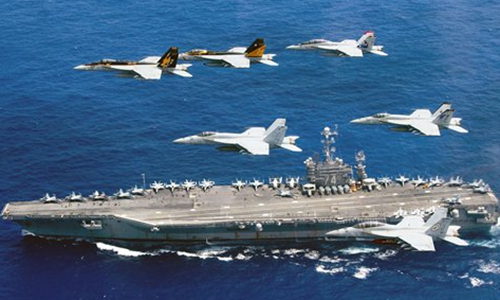China releases report on US military presence in Asia-Pacific, warns of increased conflict risk
By Liu Xuanzun Source:Global Times Published: 2020/6/21 20:44:51

File Photo: AFP
China is set to release its 2020 research report on the US military presence in the Asia-Pacific region amid the US' recent increased military activities near China, including repeated trespassing into China's territorial waters in the South China Sea by warships this year. The possibility of a conflict could substantially increase, which must be managed and prevented, the report says.
To be published by China's National Institute for South China Sea Studies on Tuesday, the report details US security policy, military presence and deployment, recent military activities and security relations in the region. It focuses on the changes brought by the US' return to the Cold War-esque great-power competition to China-US military relations, and evaluates the positive role of China-US military relations in stabilizing bilateral relations in the new era, according to an abstract of the report the institute sent to the Global Times on Sunday.
The report notes that since the Trump administration took office in early 2017, it identified "great-power competition," reminiscent of the Cold War, for the first time in a strategy document on national security, and its Indo-Pacific strategy took shape by the end of 2018, which is ultimately aimed at protecting US supremacy in global and regional affairs, covering not only security but also political and economic issues.
According to the report, the US has 375,000 enlisted members of its Indo-Pacific Command, including 60 percent of its Navy ships, 55 percent of its Army and two-thirds of its Marine Corps. In addition, with 85,000 forward-deployed soldiers and a large amount of high-tech and new weaponry, the US military has maintained its absolute supremacy in the Asia-Pacific over the years, while also keeping to seek new deployments, budgets and resources using China's and Russia's military development as excuses.
In 2020, the US took a series of measures to contain China, on topics including COVID-19, Hong Kong, Taiwan, high-tech and the military. Recently, US warships have repeatedly trespassed into Chinese territorial waters around the Xisha and Nansha islands, conducted operations in the South China Sea and crossed the Taiwan Straits. In a rare move, it has deployed three aircraft carriers to the region.
Chinese military experts told the Global Times that China has expelled the trespassing US warships and conducted exercises to boost its combat capability, showing its will and capability to safeguard its sovereignty and territorial integrity.
US' military operations could easily trigger accidents, which risks further escalations, the experts said.
Given their close connection with state-to-state relations and national security, there is no doubt that confrontation and even deteriorating military relations between China and the US would substantially increase the possibility of a conflict, or even a crisis in their bilateral relations, the report reads.
This is also not wished by other countries in the region, as they would be forced to choose sides between China and the US since any military conflict between the two countries will get them involved, the report said.
China has been actively and properly handling its military relationship with the US in accordance with the principles of non-conflict, non-confrontation, mutual respect and win-win cooperation, and the two countries need to focus on managing their differences and preventing conflicts, said the report.
The US, on the other hand, has forward-deployed a large number of its forces, strengthened and deepened its military alliances and conducted intensive provocative activities targeted at China, leaving China with no alternative but to increase its military budget and build up its military forces as appropriate to uphold its national security.
Both countries should keep communication channels open, implement the military confidence building and crisis prevention agreements and create conditions for communication and dialogues on nuclear security, cyberspace, outer space and artificial intelligence to manage their differences and prevent conflicts, the report suggests.
Newspaper headline: US military in Asia-Pacific increases conflict risk: report
Posted in: MILITARY,CHINA FOCUS